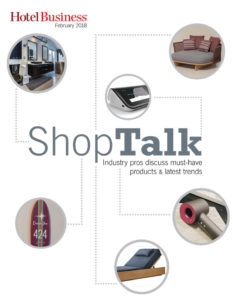 Integrity, loyalty, timeliness and strong vendor relationships are just some of the hallmarks of a great purchasing company. But, there’s much more to the selection process and there are other factors to consider before enlisting one for a hotel project.
Integrity, loyalty, timeliness and strong vendor relationships are just some of the hallmarks of a great purchasing company. But, there’s much more to the selection process and there are other factors to consider before enlisting one for a hotel project.
Hoteliers may want to ask: Are they collaborative with key stakeholders—clients, designers and manufacturing partners? Can they manage schedules effectively and deliver on time? Can they strike a fine balance between price and quality, providing the best value?
Hotel Business enlisted the expertise of owners/operators, designers and others to weigh in on how to select the right purchasing company for the work to be done.
“Anyone can take a spec and create a purchase order, but a qualified company will make sure that standards are adhered to. Your purchasing agent is the last stopgap before the product shows up on site, and it could be costly if it is incorrect,” said Laura West, managing partner, Distinctive Hospitality Designs LLC. “An agent who knows brand standards is essential.”
 Working with a company that has extensive, proven experience is crucial to the outcome of the project. The best purchasing company for the job should be well versed in the type of project it’s bidding for.
Working with a company that has extensive, proven experience is crucial to the outcome of the project. The best purchasing company for the job should be well versed in the type of project it’s bidding for.
“There are a couple of key characteristics we look for in a good purchasing company. The first is track record. We ask, ‘Who have they done business with? Are those people willing to give a reference?’ And the second is brand familiarity,” said Sunny Desai, president & CEO, Desai Hotel Group. “As a company, we only do business with a handful of franchisors so we like to see that the purchasing company has done similar brands in the past. There are specific requirements that need to be met by brands when ordering. We don’t want to be the ones with whom they make mistakes.”
At Baskervill, quality and performance are top of mind—not just price, according to Patricia Lopez, senior interior designer at the firm.
“Purchasing firms are essential to the success of every project we do. We really look for companies that can bring with them relationships with various styles and types of vendors from across the world,” she said. “Strong relationships mean they can negotiate on price but keep quality and design intent in mind, which is important to us. And, of course, service and performance that goes above and beyond client expectations—both ours (as designers) and our end-user clients.”
Kal Patel, CEO of Crestpoint Companies, asserted that solid connections make all the difference. “We look for where they are sourcing the goods—what vendors they have relationships with—and what type of warranties they have,” he said. “Is the company a true turnkey solution provider? We like to have a company that can source everything for us as a one-stop shop so that we can focus on the construction of our new hotels or operations of our existing hotels.”
“Every agency has a slightly different approach and organization; finding a company and team that works for you can take a few tries. Once you find a team you like, stick with them,” advised Marjorie Feltus Hawkins, principal, Feltus Hawkins Design. “Purchasing is about relationships, as is most business. You want the purchasing agent to be on your team. Some will take the design and then completely destroy the look to cut costs, but a good team will be able to [find]creative solutions for budgets and operations while still maintaining the design intent for the project.”
What’s the biggest piece of advice for getting to know a new purchasing company? Have them do a mock budget, noted Desai. “Ideally, they would do one of a hotel you have just completed, so you can compare numbers,” said Desai. “For example, we require new purchasing companies to do budgets on an 80-room Hampton Inn because it is easy for us to compare numbers across other past and future projects.”
In addition, it’s important for hoteliers to understand how a company manages its global sourcing, according to Ted Carroll, president, The Carroll Adams Group.
“How do they select and manage vendor relationships? Do they invest in visiting factories both in the U.S. and abroad? We have a program where every purchasing employee visits a factory for each major commodity—seating, casegoods, lighting, etc. Not only is it important professional development for our teams, it helps us be better prepared for the changing requirements of hotel design,” said Carroll.
Technology also plays a key role in seeing a project to completion. “Hoteliers should also look at a company’s purchasing software and project approach, both of which require innovation to add value,” added Carroll. “And, as much as the right technology and approach can result in a more cost-effective business model, it’s still important for clients to remember that with most commodities and services, the low bid doesn’t always mean the best bid.”

